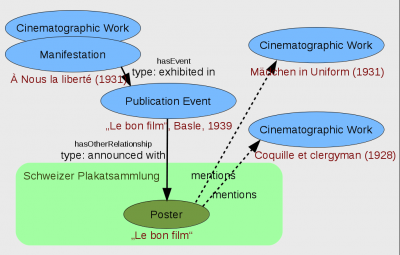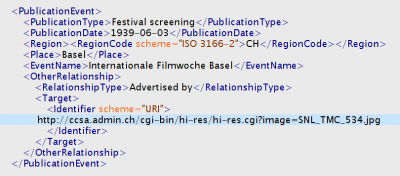Difference between revisions of "Relating artifacts with events"
From filmstandards.org
| Line 48: | Line 48: | ||
| valign="top" width="405px" |[[File:Basel1939-diag1.png|400px]]<br /> | | valign="top" width="405px" |[[File:Basel1939-diag1.png|400px]]<br /> | ||
<span style="font-size:8pt"> | <span style="font-size:8pt"> | ||
| − | |||
</span> | </span> | ||
| Line 55: | Line 54: | ||
If we '''associate the poster''' by including the URI reference, then we create a discovery path (dotted lines) for those users that may be interested in learning about the context in which the film was shown. | If we '''associate the poster''' by including the URI reference, then we create a discovery path (dotted lines) for those users that may be interested in learning about the context in which the film was shown. | ||
| + | |} | ||
| + | |||
| + | {| style="float: right; border: 1px solid #BBB; margin: .46em 0 0 .2em;" | ||
| + | |- | ||
| + | | valign="top" width="405px" |[[File:Basel-xml.png|400px]]<br /> | ||
| + | <span style="font-size:8pt"> | ||
| + | </span> | ||
| + | |||
| + | | valign="top" width="405px" | | ||
| + | This is what an XML encoding of the '''publication event''' at the Basel festival could look like. '''Associating''' the poster '''via this event''' gets us a bit closer to reality than associating it with the manifestation or the work level. | ||
| + | |} | ||
| + | |||
| + | {| height="20px" width="100%" | ||
| + | |- style="text-align:center; " | ||
| + | |<span style="color:#808080"> • Previous: [[Clarifying the seemingly obvious: Cast and credits]] • Up: [[TC 372 Workshop Compendium|Contents]] • Next: [[Relationships with objects in other databases]] • </span> | ||
| + | |- | ||
|} | |} | ||
Latest revision as of 09:31, 6 April 2011
From the TC 372 Workshop Compendium
Is this still filmography?
Cinematheques often collect other objects besides films. Examples are posters and other promotional material, screenplays, photographs and drawings, and even 3D objects that can be exhibited in museums.
Associating these objects with cinematographic works is often semantically questionable. Associating them with events, however, is often straightforward.
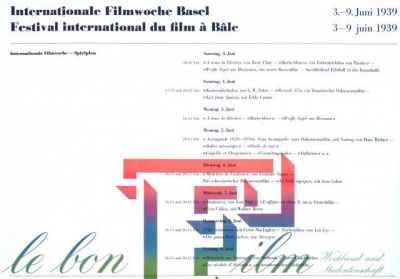 From: http://ccsa.admin.ch/cgi-bin/hi-res/hi-res.cgi?image=SNL_TMC_534.jpg |
This is a poster for the Basel International Film Festival of 1939 that took place under the name Le bon film. Let us assume we have found it because it contains an exhibition programme mentioning À Nous la liberté, a French film from 1931. |
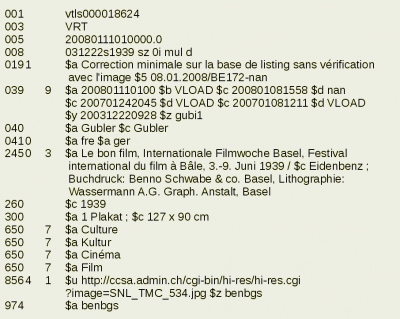 From: http://ccsa.admin.ch/cgi-bin/hi-res/hi-res.cgi?image=SNL_TMC_534.jpg |
... and this is the MARC metadata record for the poster in the Swiss Poster Collection. Note that tag 856 of the record contains a URI for viewing the poster. This URI can be used as a link target for any application where we wish to include a reference to the object. |
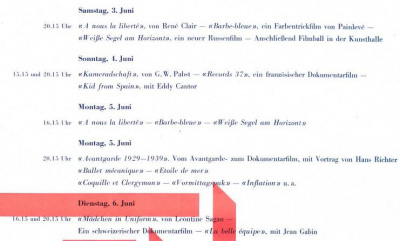 From: http://ccsa.admin.ch/cgi-bin/hi-res/hi-res.cgi?image=SNL_TMC_534.jpg |
Taking a closer look at the programme reveals that À Nous la liberté was actually scheduled twice for screening on different days. The programme also tells us which other films had been selected by the programme committee. |
| • Previous: Clarifying the seemingly obvious: Cast and credits • Up: Contents • Next: Relationships with objects in other databases • |
